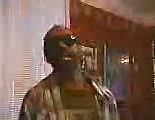The most offensive tactic in the radio activists’ arsenal has been taking to the air without a license, thereby reclaiming a small spot on the dial where former radio listeners can become broadcasters.
But change appears to be in the air: recent reports from around the country point to a growing use of stronger tactics put to use. They involve turning commercial and public radio outlets against themselves.
Two methods of accomplishing this have been demonstrated recently. The first is the “signal hijack,” which can be accomplished in a variety of ways. All of them allow the rogue broadcaster to temporarily disrupt or even take over a licensed station’s signal. Continue reading “Feet in the Fire”
Category: Pirate Radio
New Year: Same Game
2001 will be a very interesting year for the U.S. microradio movement. It is enjoying more popularity than ever even though a recent legalization effort was severely curtailed.
Unfortunately the long and protracted battle for low power radio licenses has come to a dismal end: commercial broadcasters and National Public Radio brought their full weight to bear to quash a two-year grassroots effort to add more voices to the dial.
FCC Commissioner Michael Powell is the likely candidate to become FCC Chairman this summer; Michael is the son of Colin Powell, President-elect George W. Bush’s nominee for Secretary of State. Consider this: Shortly before the FCC approved the merger of AOL and Time Warner last year, Colin Powell moved much of his investments into AOL stock – and reaped a killing when the merger was approved by his son. Continue reading “New Year: Same Game”
FCC: More Bark than Bite?
Fudging the Numbers for Victory
Pirate radio broadcasters in America have been locked in a low-intensity war with the government that shows no sign of slowing down. The Federal Communications Commission “declared war” on unlicensed radio back in 1997 after the broadcast industry urged them to do so.
What’s resulted over the last three years has been a traditional guerrilla battle involving hit-and-run attacks that result in publicity for the FCC and relatively little damage to the pirates.
There are signs, though, that the free radio has an upper hand in the war right now. Continue reading “FCC: More Bark than Bite?”
Hacking the Dial
In the wake of stepped-up enforcement efforts by the FCC and a move by the radio industry to quash new legal community radio stations, microradio activists are thinking of embracing strategies to broadcast that go beyond setting up their own stations.
This fall in Green Bay, someone hijacked the local public radio affiliate by breaking into its transmitter building, splicing a cheap CD player into the air chain and hitting “play.”
Though technically daunting and physically risky, the “station hijacker” was able to broadcast death metal for several hours before someone from the station noticed. Continue reading “Hacking the Dial”
Free Radio – A Documentary Video
Note: Clicking on any bordered pictures in this feature spawns a clip from the documentary
Real Player required
The last time someone chronicled the story of free radio in the United States on video or film was Pump Up the Volume, and before that there was only one DIY-style video out there, which has long ceased production and distribution.
 The story of modern microradio had yet to be told; enter Kevin Keyser, a field producer working in mainstream TV news on the West Coast. He once did a story for his station on Stephen Dunifer and Free Radio Berkeley and was intrigued by the concept of unlicensed broadcasting. Unfortnately, the story that ultimately aired didn’t do Dunifer justice – as was the problem with much of the news Keyser found himself covering. It wasn’t his fault, though – it was the medium’s. Continue reading “Free Radio – A Documentary Video”
The story of modern microradio had yet to be told; enter Kevin Keyser, a field producer working in mainstream TV news on the West Coast. He once did a story for his station on Stephen Dunifer and Free Radio Berkeley and was intrigued by the concept of unlicensed broadcasting. Unfortnately, the story that ultimately aired didn’t do Dunifer justice – as was the problem with much of the news Keyser found himself covering. It wasn’t his fault, though – it was the medium’s. Continue reading “Free Radio – A Documentary Video”
Global Microradio
From its roots some seven years ago as a completely homebrew station cobbled together from spare parts and junk, 2000 Flushes Pirate Radio graced the Twin Cities airwaves with its own brand of dissent.
It dropped off the dial pretty quickly, though, making sporadic reappearances over the past near-decade.
Earlier this month, 2000 Flushes came back with a vengeance. Continue reading “Global Microradio”
Trading Shots With the FCC
(Click on images to play video clips)
Enforcement efforts against unlicensed broadcasters have stepped up nationwide. Just two days after recent protests at the National Association of Broadcasters radio convention in San Francisco concluded, Humboldt (CA) Pirate Radio received three visits from FCC agents.
Then, Radio One Austin (TX) was raided by law enforcement and had its station equipment destroyed; and a station in Michigan was sent a letter to stop broadcasting or face the consequences.
 But the most dastardly blow was the silencing of Human Rights Radio in Springfield, Illinois. Continue reading “Trading Shots With the FCC”
But the most dastardly blow was the silencing of Human Rights Radio in Springfield, Illinois. Continue reading “Trading Shots With the FCC”
The Dark Side Regroups
Life has not been kind to the microbroadcaster as of late – it’s almost as if the radio industry is goading free radio fighters into a conflict when the two camps clash head-on next week in San Francisco.
First came word early this month that Micro Kind Radio, a microradio station in San Marcos, Texas – who’s been on the air 24 hours a day seven days a week since 1997 – has been shut down due to a temporary federal court injunction.
This showdown was long in coming: more than two years ago, after unsuccessfully attempting to intimidate one of the founders of Micro Kind with an $11,000 fine, the FCC served Kind with a cease and desist order. The station responded by filing a lawsuit of its own claiming the FCC’s licensing rules ran afoul of the First Amendment right to freedom of speech. Continue reading “The Dark Side Regroups”
The Pirate's Presidential Primer
Now that the two major political parties in America have have wrapped up their dog-and-pony shows for their respective Presidential candidates, it’s time to start thinking about who to cast that ballot for.
While it’s almost a sure thing one of the Republicrats will win, there are more than two choices on your ballot – and every vote counts – so make sure to spend it on the candidate you truly believe in.
That being said, there are many single-issue voters in America; it’s why things like taxes, crime, education, abortion and the like tend to garner a lot of discussion during the campaign circus process. Continue reading “The Pirate's Presidential Primer”
Broken Blackout Breaks Back
Napoleon Williams has taken his share of punishment for running his own radio station, and then some. He’s faced trumped-up charges, the loss of his children, and strong-armed police – all for stepping up and speaking truth to power.
Now, after fighting for nearly 10 years, Napoleon Williams is off the air and on the run.
The saga begins on August 21, 1990 in not-so-racially-harmonious city of Decatur, Illinois: That is when Williams signs Black Liberation Radio on the air for the first time. The motive: Expose and force change in the attitudes and policies that were a source of constant tension within the community. Continue reading “Broken Blackout Breaks Back”